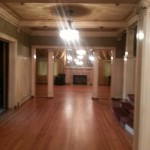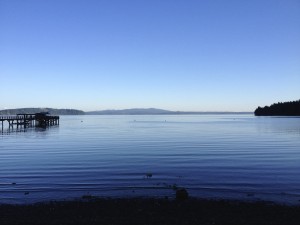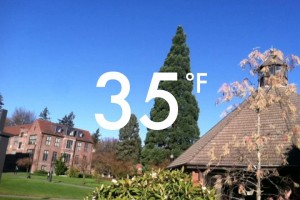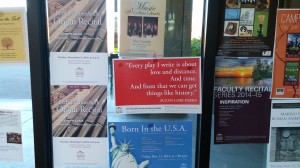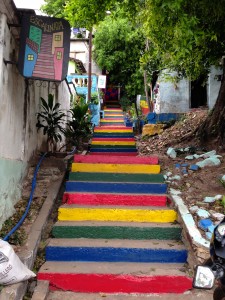Because I came to University of Puget Sound. Because I joined the sailing team, and because the Northwest college sailing conference scheduled its fall Eugene regatta for this weekend. Because sometimes life works out this way, I was there, singing to my grandma with a small chorus of other family members. I won’t question it too much; I guess you could say it was meant to be.
The rain was thrashing down and pooling on I-5 on our way down. I was in a car with four people I’d scarcely exchanged words with, nodding off to the pounding of weather and windshield wipers and cars. We got to the house we were staying at, the home of one of the U of O sailors, later than I thought we would and crashed with our ten other teammates in his living room, one person taking a sleeping pad to the kitchen once every nook and cranny of floor space was already full.
A few hours of fitful sleep later, we we were driving past the glassy water of the Fern Ridge Reservoir. When the wind picked up later it would get a “churned mud” look about it, but with the morning pinks and blues reflecting off its perfectly calm surface, the reservoir was beautiful.
In Spanish we’ve been reading sonnets about the passage of time and the decline of beauty, in which roses are doomed to die by icy winds at the coming of winter. These icy winds have been playing around campus lately, knocking branches off trees, sculpting icicles that hang off of Jones fountain. The winds were knocking down branches in Eugene that day, freaking out my mom’s friend Cathy as she drove along a country highway to come pick me up.
The winds came to the reservoir, gusting, powerful but not icy, turning the glassy reservoir into a cauldron of waves lining up to crash against the dam at the far end. Ellen, my fresh-into-college crew, stayed impressively calm as a gust took us far from the start line, and helped me tack over so we could make our way back on a reach.
There are winds that bear me up, and winds that knock me down, and that day the winds knocked our boat right over, a puff hitting us as we turned downwind. I stood on the centerboard, pulling, trying to leverage my weight against the inevitable motion, but the boat kept flipping a full 180 degrees and I was forced to fall back in the water. We righted the boat and climbed back in, but as I was contemplating whether to try and race, the other boats headed for the dock; the wind was too dangerous to continue.
Cathy and my sisters were there when we got back to the dock, Ellen and I proud to have made it out alive, but ashamed of the mud stain left on the sail from its encounter with the bottom of the lake.
When I was in Chile, I learned about an old rural tradition (I don’t know if it’s still practiced) in which infants that die are dressed as “angelitos,” “little angels,” complete with little feathery wings attached to the backs of their clothing. As it was told to me, friends and family are not supposed to cry, lest their tears weigh down the wings of the angels. Instead, they sing, and the baby’s soul flies up to heaven.
Cathy and my sisters took me to my grandma’s house, and we sang to her, barely holding on to life, perhaps entirely unconscious, her soul readying itself for flight. We sang old Irish and German folk songs and hymns, and laughed until we cried as my mom sang in her munchkin voice a few lines from “Wizard of Oz.” My cousin played his fiddle. We said goodbye. We weren’t afraid to cry, but hoped that the wind of our breath as we sang would buoy my grandma up when she was ready to depart.
The next morning I was back at the yacht club, where the golden sunshine and light breeze signaled a day of easy, casual sailing. I was thinking about endings, about the beauty of the “last time,” and how there will be so many “lasts” this year, as I say goodbye to a particular kind of life and embark on a new one. I look forward to the annual traditions that I have taken part in and will take part in just once more, but I know that woven into the fabric of traditions and plans I have for this year are entirely new moments, unexpected and memorable. Singing goodbye to my grandma. That golden light across the water. Remembering what a beautiful and strong heritage I have, and what a loving family I have to share it with.

